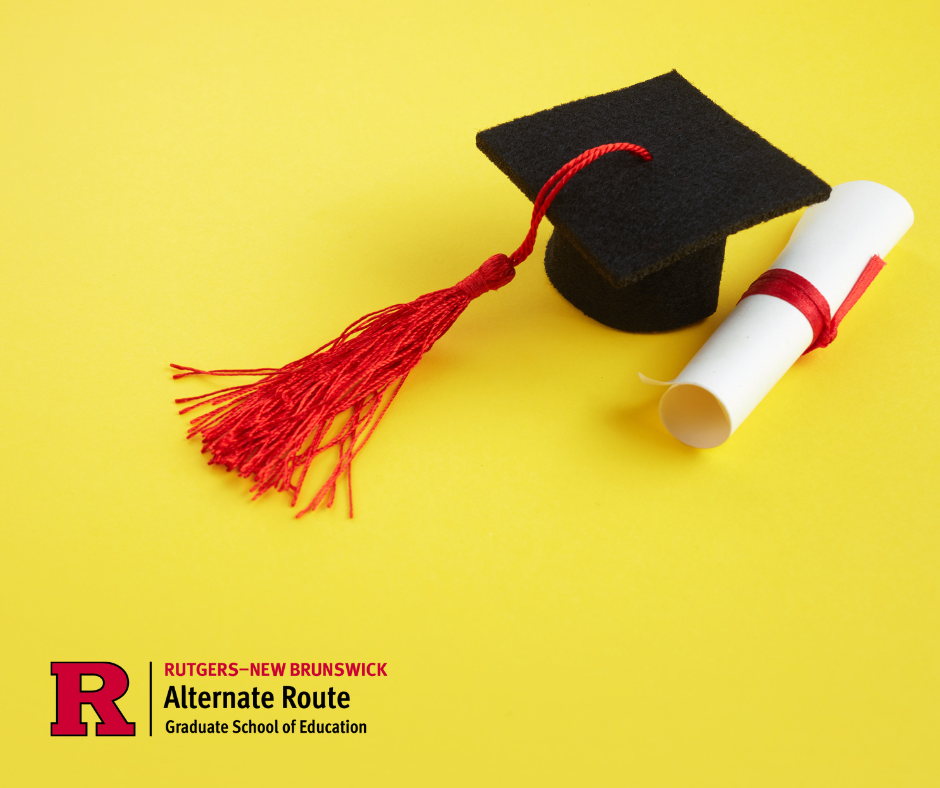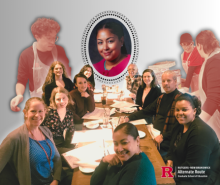Teaching Pathways That Don't Involve a New Degree

Rutgers Alternate Route exists so future teachers don’t have to start a new degree program to enter the profession. The program dispels the myth that if you didn’t major in education during college, becoming a teacher and getting certified is no longer possible.
New Jersey has hundreds of highly trained teachers who earned their teaching license through Rutgers Alternate Route, leveraging their bachelor’s degree and content knowledge, which they demonstrate on licensing exams. According to Teacher Apprenticeship Network (TAN) Founder and Executive Director Kwamé Floyd, it’s all about making the path to teaching easier for those who want a career in education.
While Rutgers Alternate Route is not the only option available to those looking for teaching avenues, it's among the most affordable and provides participants access to New Jersey’s most qualified education experts, including current and former teachers, administrators, professors and education consultants.
“For years, the Rutgers Alternate Route program has provided an affordable, high-quality and flexible option for aspiring teachers,” Floyd said. “This is in the same spirit as TAN's approach.”
Floyd is one of many people inspired by the teacher apprenticeship model, which is paid, on-the-job teacher training for support personnel interested in teaching. Introduced in 2021, the model proved so successful that by May 2024, President Joe Biden’s administration expanded registered Teacher Apprenticeship programs to 34 states, the District of Columbia and Puerto Rico. In November, that number grew to 46.
Teacher apprenticeship programs don’t just open doors for support staff, they also help address the nationwide teacher shortage, particularly in critical subjects like math, science, bilingual education, ESL and special education.
Read on to learn about teaching pathways that don’t involve a new degree, including the aforementioned teacher apprenticeship programs.
Career changers don’t need to start from scratch
New Jersey requires all teachers to have a bachelor’s degree, which means many career changers have already completed the longest step. The next few steps are a little more challenging, however.
“The path to becoming a teacher is complicated and expensive,” Floyd said. “There are hundreds who want to become a teacher and can't figure it out.”
That’s why teacher apprenticeship programs are effective.
Focusing on the skills substitute teachers and paraprofessionals gained from hands-on experience, teacher apprenticeship programs leverage the knowledge gained from daily life in a classroom. Participants’ clinical training is conducted through a mentor teacher who is trained through the program. This mentor provides support, teaches on-the-job skills, helps navigate responsibilities and measures the apprentice’s progress. This model gives districts the power to shape their workforce by providing opportunities for staff to excel within the school district they already serve.
“It’s vital that we support the paraprofessionals and classroom aides in our educational system. Many of these professionals have worked tirelessly in classrooms for years and aspire to earn their teacher certification–but they face obstacles such as the cost of tuition and availability of programming,” Acting Commissioner of Education Kevin Dehmer said in a statement.
Substitutes and paraprofessionals don’t need to choose school over work
Time management is historically a challenge for career changers who want to go into teaching. Between work, family and personal obligations, incorporating regular classes into the mix simply isn’t possible for some.
Rutgers Alternate Route has supported New Jersey career changers and their teaching goals for more than two decades. Now, teacher apprenticeship programs are filling in the gaps for already working substitute teachers and paraprofessionals, a previously untapped talent pool.
Greg Del Russo, a former teacher and current district leader at iLearn Schools, has experienced many changes in public education during his multi-decade career. Still, one thing has remained the same over the years: the important role of support staff in schools.
“I've seen that teachers' aides and substitute teachers are more valuable and play an even larger part in student learning than most people likely realize.”
Providing professional-development opportunities for substitute teachers and paraprofessionals has proven successful in New Jersey. Thanks to TAN, the state will see potentially thousands of new teachers in the next few years.
“We've had over 200 applicants in the first six months of operation, which indicates that New Jersey residents want to answer the call to become teachers,” Floyd said. “This tremendous show of interest is also an indication that TAN is providing a barrier-free pathway for talented leaders to enter our classrooms.”
TAN’s response shows demand is high for additional pathways to teaching. And, thanks to a recent New Jersey Department of Education grant, one more option is available.
A new pathway to consider
Teacher apprenticeship programs benefit substitute teachers and paraprofessionals because financial demands and time constraints are no longer a challenge, as the teacher apprenticeship model is what is often referred to as ‘earn and learn.’
ParaPreppEd is another example of a teacher apprenticeship program removing barriers for district support staff. Supported by the New Jersey Teacher Apprenticeship Program grant, ParaPreppEd helps districts support college-degree-holding paraprofessionals and substitutes in becoming full-time licensed K-12 teachers.
ParaPreppED is driven by the expressed interests of district leaders who wish to identify overlooked or hidden teaching talent among eligible paraprofessionals and substitutes the district can support to fill teaching vacancies, including those in Special Education, Science and Math, and English as a Second Language or Bilingual Education.
Overall, the program aims to:
- Increase the number of Registered Teacher Apprenticeships in the state;
- Expand the teacher pipeline, leveraging the existing district talent;
- Address barriers for aspiring teachers through targeted support like Praxis prep; and
- Conduct and disseminate ongoing research on the implementation and impact of the initiative.
“Investment in these professionals is not only a moral imperative, but it is also our most viable path to saving the teaching profession,” Floyd said.
If you’re considering following your dream of teaching, Rutgers Alternate Route can offer you the support and training you need to succeed. Be sure to follow Rutgers Alternate Route on Twitter and sign up for Alternate Route’s monthly newsletter for more information and stories from the field of education.

 Heather Ngoma has over 25 years of experience collaborating with educators across New Jersey to drive education innovation. She currently serves as the Director of the Rutgers-GSE Alternate Route Program in the Department of Learning and Teaching, a program which helps career changers, recent college graduates, and other aspiring education professionals become licensed teachers in New Jersey. Follow her on Twitter @heatherngoma.
Heather Ngoma has over 25 years of experience collaborating with educators across New Jersey to drive education innovation. She currently serves as the Director of the Rutgers-GSE Alternate Route Program in the Department of Learning and Teaching, a program which helps career changers, recent college graduates, and other aspiring education professionals become licensed teachers in New Jersey. Follow her on Twitter @heatherngoma.





